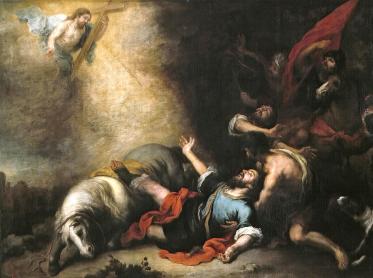 From Darkness to Light
From Darkness to Light
Saul was on the road to Damascus to arrest Christian believers. While en route he experienced one of the most dramatic conversions recorded in the Bible. In his own words:
“I was traveling to Damascus with the authority and commission of the chief priests, when at midday along the road, your Excellency, I saw a light from heaven, brighter than the sun, shining around me and my companions. When we had all fallen to the ground, I heard a voice saying to me in the Hebrew language, `Saul, Saul, why are you persecuting me? It hurts you to kick against the goads.’ I asked, `Who are you, Lord?’ The Lord answered, `I am Jesus whom you are persecuting. But get up and stand on your feet; for I have appeared to you for this purpose, to appoint you to serve and testify to the things in which you have seen me and to those in which I will appear to you. I will rescue you from your people and from the Gentiles– to whom I am sending you to open their eyes so that they may turn from darkness to light and from the power of Satan to God, so that they may receive forgiveness of sins and a place among those who are sanctified by faith in me.’ ” (Acts 26:12-18)
Well, that was Saul. He was persecuting Christians. Do we have any zealous people in the Church today who are crushing their fellow parishioners? Well, that is another story.
What about those who have grown up in the Church? Do they need a conversion experience? We need to understand that the Apostle Paul did grow up in the Church. He grew up in Judaism which was the only church in his day. The rest of the world was pagan. He was living by the rules. He was educated in the best rabbinic tradition. Here is how he described himself:
Circumcised the eighth day, of the nation of Israel, of the tribe of Benjamin, a Hebrew of Hebrews; as to the Law, a Pharisee; as to zeal, a persecutor of the church; as to the righteousness which is in the Law, found blameless. (Philippians 3:5-6)
I was advancing in Judaism beyond many Jews of my own age and was extremely zealous for the traditions of my fathers. (Galatians 1:14)
We understand, of course, that this was the way Saul described himself before his conversion. How did he express himself after his conversion?
I do not understand what I do. For what I want to do I do not do, but what I hate I do. And if I do what I do not want to do, I agree that the law is good. As it is, it is no longer I myself who do it, but it is sin living in me. I know that nothing good lives in me, that is, in my sinful nature. For I have the desire to do what is good, but I cannot carry it out. For what I do is not the good I want to do; no, the evil I do not want to do—this I keep on doing. (Romans 7:15-19)
Paul goes on to say:
Wretched man that I am! Who will rescue me from this body of death? Thanks be to God through Jesus Christ our Lord! (Romans 7:24-25)
Conversion opened Saul’s eyes to reality. His religion had failed him. He needed more than religion. His Lord Jesus Christ did not fail him:
But whatever things were gain to me, those things I have counted as loss for the sake of Christ. More than that, I count all things to be loss in view of the surpassing value of knowing Christ Jesus my Lord, for whom I have suffered the loss of all things, and count them but rubbish so that I may gain Christ, and may be found in Him, not having a righteousness of my own derived from the Law, but that which is through faith in Christ, the righteousness which comes from God on the basis of faith, that I may know Him and the power of His resurrection and the fellowship of His sufferings, being conformed to His death; in order that I may attain to the resurrection from the dead. (Philippians 3:7-11)
Saul became the great Apostle Paul who wrote two-thirds of the New Testament. Does his testimony speak to us today? What is our testimony? Are we merely rules enforcers or are we ambassadors for Christ? The lost in this world are counting on us to witness the love and mercy of our Lord Jesus Christ.
Paul was a rules enforcer who grew to understand God’s mercy and loving-kindness. He prayed for the Church in Ephesus:
I pray that, according to the riches of his glory, he may grant that you may be strengthened in your inner being with power through his Spirit, and that Christ may dwell in your hearts through faith, as you are being rooted and grounded in love. I pray that you may have the power to comprehend, with all the saints, what is the breadth and length and height and depth, and to know the love of Christ that surpasses knowledge, so that you may be filled with all the fullness of God. (Ephesians 3:16-19)

